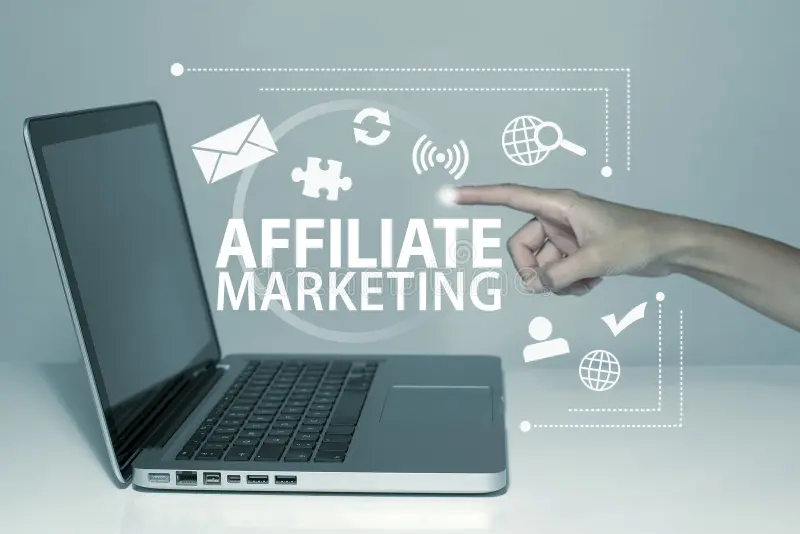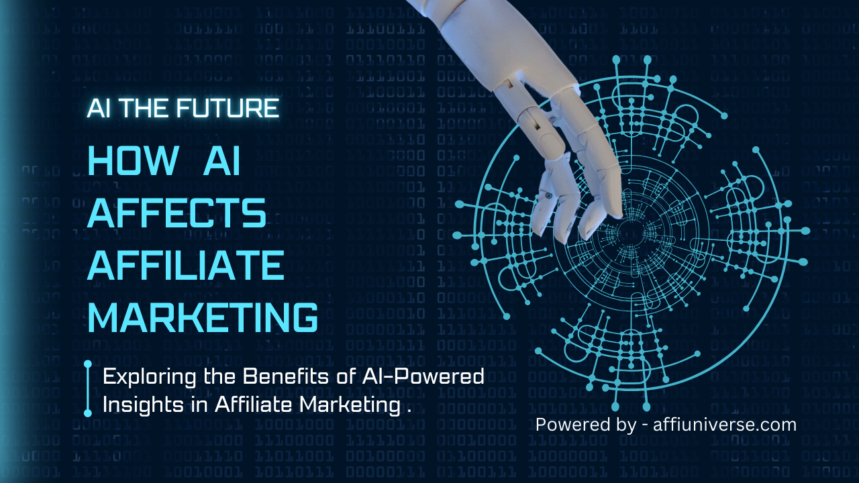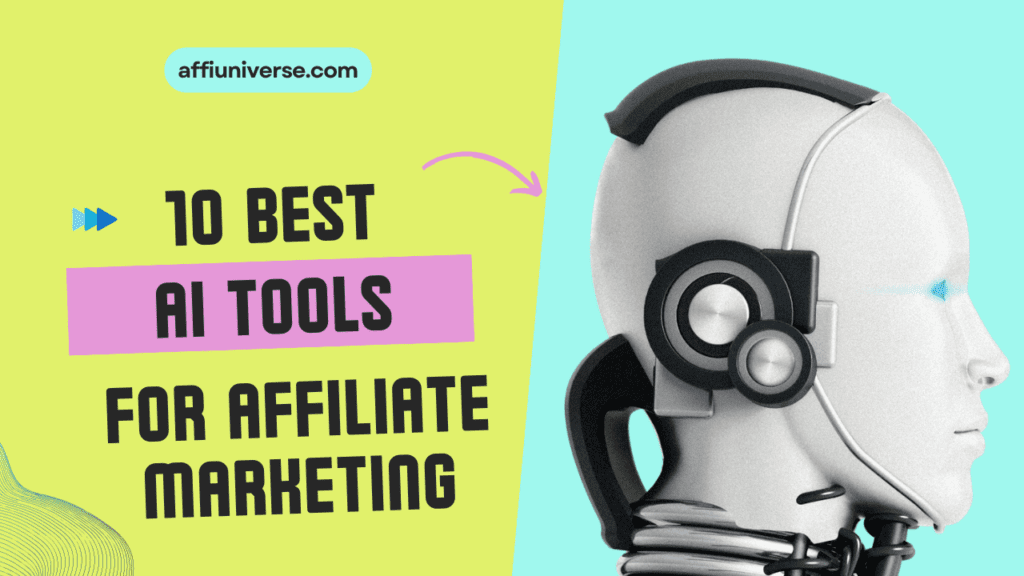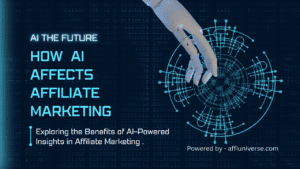In the endlessly revolving field of digital marketing, artificial intelligence has become a force to behold as it continues to revolutionize common approaches and challenging business’s marketing approaches to consumer communication. The field that has seen a huge impact of AI is the affi. marketing business. In this article, the author focuses on the topic of AI and Affi. Marketing discussing its uses, advantages, and drawbacks, as well as some possibilities of future development.

Understanding Affiliate Marketing
The affi. marketing is a type of marketing in which businesses which are known as advertisers pay commission to affiliates known as publishers for every traffic or sale they generate. Affi. marketing is being done on the commission basis and this involves commissions usually coming from the total traffic that is referred to the specific website of the advertiser or from the sales that are made upon the traffic referred.
Directly, affi. marketing started as a system where most of the tasks like conversion tracking, partnership and campaign management were handled manually. However, the traditional marketing communication processes have reduce due to the coming in of Artificial Intelligence making the affi. marketing enhanced.
Related Article : 30 ESSENTIAL AI TOOLS WHICH BOOST AFFILIATE MARKETING
Affiliate Marketing and its relation to the integrated version of AI
The main AI technologies that are crucial in changing trends of affi. marketing include machine learning, natural language processing and predictive analysis. Here’s how AI is reshaping various aspects of affi. marketing :
Targeting and Personalization :
JP’s AI programmes calculate massive amounts of information regarding consumer behaviour, their consumptive habits and trends. Contracted to the former, this approach assists the advertisers with the discovery of affi. marketing partners who own readerships that appeal to the target demographic. AI also helps in implementing distinct marketing tactics where content and suggestions on the relevant sites are customized depending on the targeted consumer’s activity.
Predictive Analytics :
Predictive analytics applied within the framework of AI, using the information about past events, defines the tendencies of the future. In affi. marketing, the use of predictive analytics when it comes to consumer needs enhances the outcomes of the marketing strategies of both the advertisers and the affiliates on board. Learning which products or which promotions to post to their site will get the most action will help the affiliate make more sales and subsequently, earn more money.
Content Creation and Optimization :
Affiliates also help to write content with the use of AI tools such as NLG to help in the generation of good content at large quantities. NLG algorithms can come up with product description, blog post, and even reviews that are informative and optimized for SEO. This automated content creation helps in optimizing affiliates’ work for this marketing technique since they can dedicate more time to its conceptualization.
Performance Tracking and Attribution :
Through AI analytics, detailed information about the specific campaigns is generated and is easily tracked, including the number of conversions, adjusting the ROI ratio, and attributing the revenue. These platforms apply sophisticated attribution models to calculate the efficacy of every affiliate touch point in the consumer sale cycle. The quality of the affiliations is crucial when choosing a marketing channel for an advertiser because by selecting and refining the best performers, the marketing expenses will have the best return.
Fraud Detection and Prevention :
Most AI algorithms help in reinforcing the caliber of the affi. marketing programs against fraudulent activities including click fraud and affiliate cookie stuffing. AI is beneficial here as it analyze several patterns and inconsistencies in data to determine suspicious activity leading to prevention of such activities. This makes it possible for advertisers and affiliates to have trust and are able to sort out any issues arising from their collaboration.
Advantages of AI in Affiliate Marketing
The integration of AI into affi. marketing offers several key benefits to advertisers, affiliates, and consumers alike :
Increased Efficiency :
Most of the monotonous and repetitive tasks are some of the advantages of automation since it eases the work of the marketer and allows them to deal with strategic and creative projects.
Enhanced Targeting :
It is possible to provide the specific audience and create individualized marketing messages due to the application of AI algorithms.
Scalability :
AI makes business scale because it deals with loads of data and is capable of managing different processes across the multiple platforms.
Improved ROI :
Analytical and predictive/logical approaches to the management of the marketing budget result in the best possible return on investments.
Better User Experience :
This promotes the interest on various products by the customers, hence making them more loyal, by making recomendations on other product which will meet their interests.
Challenges and Considerations
Despite its transformative potential, the adoption of AI in affi. marketing presents certain challenges and considerations :
Data Privacy :
The consumers ‘data has to be handled responsibly and the organization has to follow data protection regulations and legislation such as GDPR.
Algorithm Bias :
These are very specific points for further development of AI algorithms to ensure that bias reflected in targeting and other decision-making processes is excluded.
Integration Complexity :
Applying AI technologies is a task that implies technical knowledge and compatibility with marketing undertakings and tools.
Cost :
A company can be put off by high costs of developing an AI-friendly environment and the subsequent costs for sustenance.
Skill Gap :
The article shows that marketers require upgrading and enhancing their skills in order to incorporate AI tools for enhancing their affi. marketing techniques.
Future Trends and Innovations
Looking ahead, several trends and innovations are poised to shape the future of AI in affi. marketing:Looking ahead, several trends and innovations are poised to shape the future of AI in affi. marketing:
Advanced Personalization :
With AI, simplified and effective marketing will always be a reality due to their ability to provide real-time data for more precise and heavily targeted content and services.
Voice Search Optimization :
Voice search is another turning moment that will affect how affiliates work their content around these procedures, all thanks to AI Voice assistants.
Blockchain Technology :
Currently, several blockchain-based affi. marketing solutions to fully unlock the capabilities of affi. marketing with greater transparency, security, and accountability of relationships between affiliate partners.
AI-Powered Chatbots :
AI integrated chatbots are going to be an imperative component in customer support and lead generation in affi. marketing structures.
The Future of Artificial Intelligence in Affiliate Marketing

As adaptive Artificial Intelligence technology remains an essential part of people’s lives, its consequences in affiliate marketing will also progress. Here are some trends and developments to watch for:Here are some trends and developments to watch for:
1. Enhanced Personalization
Many more companies will offer fully customized, quantitative experiences based on artificial intelligence that will target users individually in real-world time. This hyperpersonalization shall thus result in increased engagement and conversation rates, resulting from the presence of highly personalized ads.
2. Voice Search Optimization
As the use of voice activated devices and speaking to the devices increase, there will be a rise in usage of voice search. It will involve the use of Artificial Intelligence for acquiring inherent abilities in natural language processing for processing user queries and generating content and corresponding recommendations.
3. Advanced Attribution Models
Artificial Intelligence will enhance aspects like attribution modelling so that marketers get a deeper insight into customer journey and the right way of crediting the same. The increased accuracy in measurement will help lead to better allocation of resources and the ensuing performance measurement.
4. AI -Driven Creativity
Artificial Intelligence’s place in content generation will grow further, whether as algorithms that create written as well as visual and moving media or as systems that design engaging interfaces. This will create new outlets for reaching audiences and customers, thus increasing possible conversions.
5. Autonomous Marketing
In the subsequent course of evolution, Artificial Intelligence could play a more proactive role in affiliate programs by overseeing entire campaigns without human intervention. This would bring about more time efficiency as Marketers use their time to develop strategies while AI helps in the execution and the finding of the better ways to execute the planned strategies.
Conclusion
Finally, it could be concluded that current AI trends are more effective in affi. marketing not only as a result of introducing new tools for better targeting, personalization and advertisers & affiliates’ performance. Yes, there are problems that AI-based affi. marketing solves: data protection issues or the problem of algorithmic prejudice, but the advantages are evident and unshakable: the efficiency increase, ROI, better user experience. With the progressive development in AI, these technologies will inevitably greatly contribute to the future prognosis of the digital advertising and affi. marketing field.
If AI innovation is done effectively and its possibilities are seized, organisations can adapt to the growing trend and remain competitive in the constantly developing digital environment. Therefore AI in the affi. marketing signifies not just the use of new technology but a tactical need in the current context of the digital environment for providing successful results and high revenue in the modern ages.






